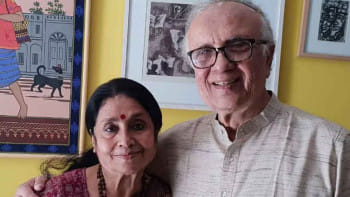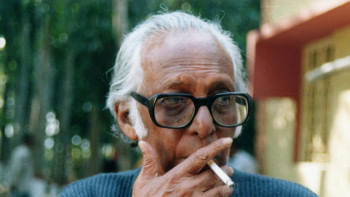'Love Letters': Companionship and melancholy etched between the lines

What happens when two unlikely individuals forge a bond so strong that it stands the test of time; when two hearts, despite the distance between them, carefully nurture their shared connection—all through penning their thoughts in letters? Can two people walking on parallel paths truly unite?
Perhaps the audience in the Neelima Ibrahim Auditorium of Bangladesh Mohila Samity, who were left in a trance after witnessing the magnificent performance by thespian couple Ferdousi Majumdar and Ramendu Majumdar recently, have found an answer.

With the premiere of its two-hander production titled "Love Letters", the theatre group, Theatre, explored the mundane musings, companionship, growth, shared nostalgia, love and loneliness of two individuals through the joy of exchanging letters at the Neelima Ibrahim Auditorium on Friday.
Based on the Pulitzer nominee play by renowned American playwright A R Gurney, "Love Letters" has been translated and adapted by Professor Abdus Selim and directed by Tropa Majumdar. This was the 48th production by the group and the second show of the play took place on Saturday.
Starring renowned acting couple Ferdousi Majumdar and Ramendu Majumdar, the epistolary play revolves around two polar opposite individuals—Maisha Islam and Ananta Shahed Chowdhury, or rather, the letters they have sent to each other throughout the years. The play required the actors to sit comfortably on their respective chairs onstage and read from the lifelong correspondence between a man and woman which lasted for six decades.

With each letter, the audience gets a clear perception of who these writers are and their personalities as the characters talk about everyday life, their views, vulnerabilities, interests and the Liberation War.
Born into wealthy families, Ananta and Maisha begin writing letters to each other from their childhood, with thank-you notes about birthday party invitations—which later become more intimate as time passes by. The two characters could not be more different, Ananta is disciplined, stoic, a dutiful son with an unwavering sense of responsibility. Meanwhile Maisha is spontaneous, flighty, larger than life, an eccentric soul with a turbulent family life.

Ananta has a penchant for writing letters about everything and anything, while Maisha is letter-averse, yet somehow never fails to respond to his letters despite her complaints, even attaching illustrations with her replies. As they move into their teenage years, it becomes difficult to maintain a friendship that blossoms in proximity, because Ananta is sent to cadet college and Maisha, to a convent school.
Still, they sustain their connection while grappling with their tumultuous feelings, perhaps having an inkling regarding their mutual attraction to one another. However, it isn't realised as they enter another chapter of their lives, Ananta pursuing law school in London and Maisha finding refuge in art. Later on, she moves to Paris and Ananta returns to the country to join the Liberation War. While the characters share mutual romantic attraction, both of them get married to different people.
The years go by and eventually they engage in an affair, albeit it is short lived for it is truly far too late for both of them. After Maisha's untimely death, Ananta sends one last letter to her mother, confessing his love for her. Two people who are completely enamoured with each other, yet physically apart due to time and life, finally are allowed to be together in the afterlife.
From teen banters to the disarming vulnerability as adults, with each wink and sigh– veteran actors Ferdousi Majumdar and Ramendu Majumdar had completely moulded themselves into the roles of Maisha and Ananta, mesmerising theatre lovers of all ages.
"Despite being devoid of gimmicks, we are happy to say that the play was well received by the audience, especially among the younger generation of directors in the theatre sector. If the acting is strong, it is possible to move the audience even with the simplest production," said Ramendu Majumdar. "This play was successful because of the director's contribution."

The actor said that "Love Letters" has been dedicated to the memory of the late eminent actor Aly Zaker—who was initially supposed to perform the play with Ferdousi Majumdar, but unfortunately, could not do so. Ramendu Majumdar also gave special emphasis on the role of music and video screened during the play.
Coupled with the illustrations by artist Pradip Chakraborty and music by Sourendro and Soumyojit, the lives of Ananta and Maisha came to life before the audience. The set, despite the simplicity, was given a personal touch with its design—a bookshelf for Ananta the erudite politician, and painting tools for Maisha, the struggling artist.
"I wanted to keep the production as precise as possible, without any unnecessary embellishments. My priority was to ensure that the audience could concentrate on the play itself and the characters. As for the characters, the two of them are polar opposites of one another and I wanted to make sure that it was evident. The seasoned actors did a remarkable portrayal of both Maisha and Ananta," said the play's director, Tropa Majumdar.
"We, as human beings, often don't realise the value of something before we lose it. This is evident in the story of Maisha and Ananta. They may be extremely different, but at the end of the day, these characters gravitate towards each other because they feel a sense of completion. Everything needs a balance. I think the beauty of this play is how it portrays real life and experiences," she added.
The set was designed by Palash Hendry Sen, while the costumes were designed by Gulshan Ara Munni. Robin Basak and Najmun Nahar Naju were the actors' assistants. The video for the play was directed by Apon Ahsan and edited by MD. Milon.
Ultimately, "Love Letters" is a story of love and the various machinations of love, however it is also a story of loneliness, of missed opportunities and what ifs—which makes it all the more heartbreaking and haunting.

 For all latest news, follow The Daily Star's Google News channel.
For all latest news, follow The Daily Star's Google News channel. 





Comments